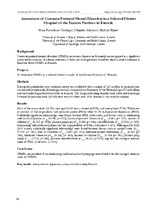Assessment of common perinatal mental disorders in a selected district hospital of the Eastern Province in Rwanda
Abstract
BACKGROUND:
Common perinatal mental disorders (CPMDs) in women (depression & anxiety) are recognized as a significant public health concern. In African countries, CPMDs are most prevalent. However, there is limited evidence inliterature about CPMDs in Rwanda.
PURPOSE:
To determine CPMDs in a selected district hospital of the Eastern Province of /Rwanda.
Methods Descriptive quantitative cross-sectional survey was conducted with a sample of 165 mothers in perinatal period selected systematically. Ethical approval was obtained from University of the Western Cape of South Africa and the former Kigali Health Institute of Rwanda. The Zungu Self-rating Anxiety Scale (SAS) and Edinburgh
Postnatal Depression Scale (EPDS) were used to collect data. SPSS version 21 was used for analysis.
RESULTS:
Most of the respondents (38.2%) were aged 25-29 years; married (44.8%); and unemployed (77%). Thirty-seven percent of the respondents had perinatal anxiety (PNA) while 50.3% had perinatal depression (PND). Statistically significant relationships were found between PNA (≥45scores) and factors such as relationship with husband/partner (c2 (2)=12.045, p=.002), husband/partner’s behaviour (c2
(8) = 16.401, p= .037), number of children (c2 (8)=16.017, p=.042), planned pregnancy (c2 (2)=8.244, p=.016), stressful events (c2 (14)=55.035, p=.000).
Relationship with husband/partner was the only predictor of PNA (Odd ratio= 0.437). With regard to PND (≥10 scores), statistically significant relationships were found between factors such as marital status (c2 (3) = 17.559, p= .001), level of education (c2 (3) =16.857, p= .001), husband/partner relationship (c2 (1) = 38.207, p=
.000), husbands’ behaviour (c2 (4) =43.242, p= .000), number of children (c2
(4) = 18.554, p= .001), planned pregnancy (c2 (1) = 17.773, p=.000), personal stressful events (c2 (7) = 30.232, p=.000). Age was the strongest determinants of PND (Odd ratio: 131.973).
CONCLUSION:
CPMDs are prevalent. Poor relationship with husband and young age were found to be the strongest determinants of CPMDs.

